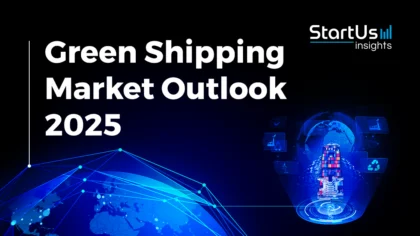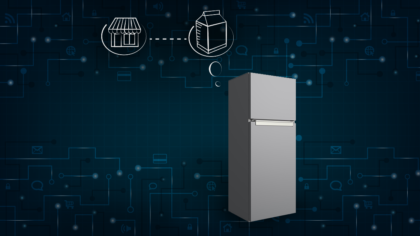Our Innovation Analysts recently looked into emerging technologies and up-and-coming startups working on innovative solutions for the maritime industry. As there is a large number of startups working on a wide variety of solutions, we decided to share our insights with you. This time, we are taking a look at 5 promising maritime emission reduction solutions.
Heat Map: 5 Top Marine Emissions Reduction Solutions
Using our StartUs Insights Discovery Platform, covering 1.379.000+ startups & scaleups globally, we looked at innovation in the field of marine technology. For this research, we identified 121 relevant solutions and picked 5 to showcase below. These companies were chosen based on a data-driven startup scouting approach, taking into account factors such as location, founding year, and relevance of technology, among others. Depending on your specific criteria, the top picks might look entirely different.
The Global Startup Heat Map below highlights 5 startups & scaleups developing innovative maritime emission reduction solutions. Moreover, the Heat Map reveals regions that observe a high startup activity and illustrates the geographic distribution of all 121 companies we analyzed for this specific topic.
Ecomar Propulsion – Electric Propulsion Systems
Fuel extraction, refinement, and consumption contribute considerably to global carbon emissions. This drives innovation in the electrification of propulsion systems in ships, which in turn, enables a significant reduction in emissions. With the advent of electric vehicles and the increase in environmental concern, the shipping industry is also adopting electric propulsion systems. For example, startups develop axial flux propulsion systems for ships to reduce their emissions.
British startup Ecomar Propulsion produces high-performance electric and hybrid marine engines. With the help of axial flux engines, the startup improves power-to-weight ratios and peak torque. The startup also offers to retrofit outboard products that are permanent magnet-based or have an axial flux design. Ecomar provides services to both the leisure and the commercial shipping industries.
We4Sea – Remote Emission Monitoring
Traditionally, ships transmit data back to shore management once a day at noon, also known as noon-report. The noon-report consolidates the performance data of ships, including fuel consumption and propeller rotations, as well as inventories and swell conditions of the seas. However, the low availability of data makes it difficult to optimize emissions over a large fleet. Startups use advanced sensors and data collection devices to gather and transmit data, in real-time, to effectively monitor and reduce emissions.
Dutch startup We4Sea develops a fuel efficiency and emissions monitoring platform for the shipping industry. With the help of its proprietary tool, the startup enables customers to monitor greenhouse gasses (GHGs) emissions in real-time. Customers equipped with fact-based carbon footprint reporting helps manage corporate social responsibility (CSR) as well as regulation and compliance reporting.
STAX Engineering – Emissions Reduction-As-A-Service (ERaaS)
Large ocean-going vessels such as container ships and cruise vessels make use of shore power, while berthed, to run auxiliary engines, boilers, and other vessel operations. Shore power is capital intensive for shipping lines as the vessels need to be retrofitted with additional equipment. Emission control, while the vessel is in the berth, is critical since port cities get polluted with particulate matter, carbon dioxide, and other pollutants. Startups develop emission reduction solutions for vessels in ports to tackle global warming.
The US-based startup Stax Engineering offers Emissions Reduction-as-a-Service for ocean-going vessels at berth. The startup uses STAXboxes, a patented universal emissions control box to remove toxic emissions and capture carbon at the source. The STAXboxes easily attach to already existing emissions sources such as auxiliary anchor boiler, diesel generators, and main boiler. STAXboxes capture particulate matter, nitrogen oxides, and sulfur oxides, as well as carbon dioxide and short-lived climate pollutants (SLCP).
Daphne Technology – Marine Exhaust Purification
Ambient air pollution from the land, sea, and air transportation contributes significantly to climate change. Combustion of heavy fuel oils (HFO) results in sulfur oxides and nitrogen oxides in the exhaust that cause acid rain, which is harmful to crops, forests, and aquatic species. Globally, governments are drafting regulations and strict penalties for non-compliance with maritime emission regulations. Startups are developing maritime exhaust filtration technologies that enable shipping companies to reduce harmful maritime emissions.
Swiss startup Daphne Technology offers marine engine exhaust purification solutions for the maritime industry. With the help of SulPure, a patented purification technology, the startup enables vessels to remove harmful pollutants such as sulfur oxides and nitrogen oxides from the exhaust gas. At the final stage of the filtration process, the startup combines urea into the exhaust gas and neutralizes any acidic gases forming solid particles. This is later repurposed as agricultural fertilizers. The installation of SulPure does not require any drydocking and typically takes 4-7 days to install.
Evoy – Inboard Electric Propulsion For Boats
Small and medium-sized fishing vessels also produce emissions that are harmful to the environment. Outboard motors typically run on marine diesel or gas oil whereas electric motors do not generate any emissions. Fishing is a major form of occupation for developing coastal cities. And electric inboard motors provide the cost-effectiveness that smalltime fishermen require to keep their businesses profitable. There are additional economic and regulatory incentives to reduce emissions as well. This encourages startups to develop electric motors for propulsion in small-sized vessels to enable even small fishermen to contribute to emission reduction efforts.
Norwegian startup Evoy produces a range of inboard and outboard electric motors for boats that are 25-30 feet (roughly 7.5-10 meters) in size. With the help of a plug-and-play high output propulsion system, the startup enables the electrification of small-sized boats. Evoy’s 400 hp liquid-cooled motor is programmable and CE-marked. Additionally, the design of the batteries enables 14,000 charging cycles in the fuel motor. The startup also offers smart boating solutions that use a touchscreen display to manage navigation, weather updates, and WiFi.
What About The Other 116 Solutions?
While we believe data is key to creating insights it can be easy to be overwhelmed by it. Our ambition is to create a comprehensive overview and provide actionable innovation intelligence and enable you to achieve your goals faster. The 5 maritime emission reduction solutions showcased above are promising examples out of 121 we analyzed for this article. To identify the most relevant solutions based on your specific criteria, get in touch.









